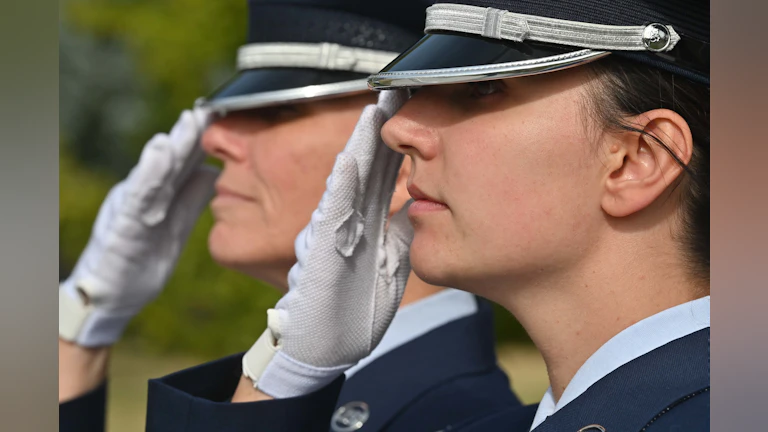Preventing Suicide in Military Communities
If a friend tells you they are thinking about killing themselves, take it seriously. If you're looking for additional resources, our general resources are also available.
How suicide impacts service members, veterans and their families
The loss of a service member or veteran to suicide impacts those connected to them, including families, military units, peer networks, and the broader community.
Since 2001, at least four times as many active duty personnel and veterans have died by suicide than were killed in combat operations during post-911 conflicts.1 In fact, most military and veteran suicides involve individuals who have never been deployed.2
After separating from service, veterans face a suicide rate 1.5 times higher than the general population.3 For women veterans, the rate is more than double that of civilian women. These disparities have not just persisted but have outpaced the increase in the general population.4
When we look at suicide rates among veterans, we see that the first 12 months after separating from the military are the highest risk period for suicide.5
Learn the facts about veteran suicide
- National Veteran Suicide Prevention Annual Report (2024)
- National Strategy to Prevent Veteran Suicide (2018-2028)
Learn the facts about suicide in the military

Support for those who are struggling
If you are struggling, help is available
If you are struggling, you don’t have to carry the weight alone. The Military & Veteran Crisis Line is available 24/7. Whether you call, chat or text, a qualified responder will listen and help. You decide how much information to share. You can call 988 and press option 1, or you can text 838255. You can also chat anonymously online at veteranscrisisline.net
Take the anonymous Self-Check Quiz
The Veteran Self-Check Quiz is a confidential and voluntary way for service members, veterans, and their families to check in on their mental well-being and explore what resources may be helpful. Individuals who complete the self-check quiz receive private, individualized feedback from a trained professional, along with recommendations for follow-up services and resources.
Veterans are seeking help now more than ever
Reaching out for help isn’t always easy, especially in military and veteran communities. Service members and veterans may feel reluctant due to mistrust of available resources or hesitation to allow others to step in and help. While these challenges persist, the truth is that service members and veterans are getting help now more than ever.6
The facts are clear—those who are connected to support are significantly less likely to die by suicide than those who aren’t. A key part of prevention is ensuring service members and veterans have access to mental health care and life-saving resources.
Secure firearm storage saves lives
Since firearms are involved in over 73% of veteran suicides, one of the most effective ways to protect a veteran in crisis is to ensure their firearms are securely stored. Temporarily creating time and distance from firearms during times of increased risk can help interrupt a moment of crisis and allow for someone to step in and help with potentially lifesaving support and resources. Learn more about firearms and suicide prevention and how you can make the environment safer.

If you are worried about a service member or veteran, trust your gut
Learn more about the risk factors and warning signs of suicide.
If you are worried about someone, proceed as though you are the only one who will reach out. Start a conversation, ask directly about suicide, and encourage them to get help. Someone considering suicide is experiencing a life-threatening health crisis and may not believe help is possible. Work with them to address their access to lethal means, such as firearms or medications and help them secure them or store off-site. Stay with them and call the Military & Veteran Crisis Line: Dial 988, Option 1.
If you are worried about a service member who is away from home
If you are concerned about a service member who may be at imminent risk but is not physically nearby, consider looking up their base web site, which typically includes a base operator who can connect you to the appropriate point of contact. If it’s after hours, on a weekend, or across time zones, you can reach out to the Veterans Crisis Line (Dial 988, Option 1) or Military OneSource (available 24/7 via secure live chat or by calling 800-342-9647). Trained personnel may be able to assist in connecting with the individual’s unit for a wellness check.
Be sure to follow up with them after the crisis to see how they’re doing. Find more information about how to help someone in need.
What does AFSP do to fight suicide in these communities?
Understand it
AFSP is the world’s largest private source of funding for suicide prevention research. Since 2018, we have funded over $700,000 in grants. Learn more about our suicide prevention research.
Educate the public
We turn research findings into education programs and equip hundreds of volunteers each year to deliver them to their communities, including a free community program to help audiences learn about the impact of suicide among U.S. veterans, along with practical ways to recognize warning signs for suicide, navigate tough conversations, and connect veterans to support in ways that respect their autonomy. Talk Saves LivesTM: Supporting Our Veterans is designed to be helpful for anyone (18+) who cares about preventing veteran suicide, especially those who may not already understand military culture or veteran issues.
Bring action to scale
AFSP engages with policy makers at all levels of government to ensure access to services and recovery for service members, veterans, and their families. AFSP also provides volunteer advocates with opportunities to get involved. See more about our advocacy work.
Community mobilization
Each day, our veterans, service members, and their families join a nationwide volunteer force across over 70 Chapters in all 50 states, as well as D.C. and Puerto Rico. Our volunteers deliver education programs, serve on local committees and boards, coordinate events, and handle everything from site leadership to setup and teardown. No matter a person’s skills or availability, we all have a place in this fight. Learn more about how to get involved.
Resources
General resources
Veterans Resources
Resource page individuals, families, and communities interested in learning more about the range of resources available to veterans.
Military and Veterans Crisis Line
988 Press 1 for access to the Veterans Crisis Line
24/7 Phone, chat, and text.
TAPS National Military Survivor Helpline
800-959-TAPS (8277)
24/7 phone and chat for military families and loss survivors.
Military-specific resources
Defense Suicide Prevention Office (DSPO)
Comprehensive guidance and resources including toolkits, reports, podcasts, and strategic priorities.
Military One Source
800-342-9647
24/7 confidential phone and chat for Veterans, service members, and their families.
Postvention Toolkit for a Military Suicide Loss
For use by Unit Commanders and Leaders, Chaplains, Casualty Assistance Officers, First Responders, Military Investigators, Non-Clinical Providers, Suicide Prevention Program Managers, and Long-Term Casualty Support Coordinators.
Safe Messaging Guide for Military Leadership
Guidance to better equip leaders with the tools and resources necessary to safely and effectively communicate about suicide with service members, units, and military communities.
Vets4Warriors
Vets4Warriors is a 24/7 confidential peer support network staffed by veterans, offering immediate assistance to service members, veterans, and their families, independent of the VA or military command.
Support during transition from active duty service
The first year following separation from active duty is a particularly high-risk period for suicide.
Military to VA Case Management
VA Liaisons for Service Members Separating/Retiring from the Military.
InTransition
The InTransition program is a free, confidential program from the Defense Health Agency that helps service members connect with mental health care during their transition out of service by connecting them with ongoing mental health care and providing one-on-one coaching to maintain continuity during the transition. Call 24/7 to enroll:
- Stateside: 800-424-7877
- Australia, Germany, Italy, Japan, South Korea: 800-748-8111
- Live Chat is available on their web page.
Onward Ops
Onward Ops is a free, veteran-led program that supports service members before and after leaving the military. It offers personalized transition planning and matches participants with trained sponsors in their destination communities to help them navigate employment, education, healthcare, and other critical needs during the first year out of uniform.
Endnotes
1. Suitt, T. H. (2021). High suicide rates among United States service members and veterans of the post-9/11 wars. Costs of War Project, Watson Institute for International and Public Affairs, Brown University. https://watson.brown.edu/costsofwar/files/cow/imce/papers/2021/Suitt_Suicides_Costs%20of%20War_June%2021%202021.pdf
2. Reger, M. A., Smolenski, D. J., Skopp, N. A., Metzger-Abamukang, M., Kang, H. K., Bullman, T. A., Perdue, S., & Gahm, G. A. (2015). Risk of suicide among US military service members following Operation Enduring Freedom or Operation Iraqi Freedom deployment and separation from the US military. JAMA Psychiatry, 72(6), 561–569. https://doi.org/10.1001/jamapsychiatry.2014.3195
3. U.S. Department of Veterans Affairs. (2025, May 6). Veteran suicide data and reporting. Mental Health. https://www.mentalhealth.va.gov/suicide_prevention/data.asp
4. U.S. Department of Veterans Affairs. (2025, May 6). Veteran suicide data and reporting. Mental Health. https://www.mentalhealth.va.gov/suicide_prevention/data.asp
5. U.S. Department of Veterans Affairs. (2025, May 6). Veteran suicide data and reporting. Mental Health. https://www.mentalhealth.va.gov/suicide_prevention/data.asp
6. U.S. Department of Veterans Affairs. (2024, July 16). Two years since launch of Dial 988 then Press 1, Veterans Crisis Line is supporting more Veterans than ever. https://news.va.gov/press-room/two-years-since-launch-of-dial-988-then-press-1-veterans-crisis-line-is-supporting-more-veterans-than-ever/